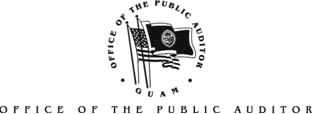
FY 2004 Financial Highlights
June 22, 2005
Independent auditors, Deloitte & Touche expressed a qualified opinion on the Guam Department of Education’s (DOE) fiscal year 2004 financial statements, citing the inability to ensure the physical presence of recorded assets and the failure of DOE to perform a comprehensive inventory of its fixed assets. Despite the qualification, DOE has, once again, met the June 30 th deadline imposed by the U.S. Department of Education (USDOE), the Single Audit Act, and local law and is now focused on attaining an unqualified or “clean” opinion in hopes of removing the “high-risk” grantee status designated by the USDOE. However, according to USDOE officials, this status will remain until DOE can prove through consistent unqualified audits and improvements to its programmatic and fiscal systems that it has met its obligations of accountability to its federal grantors.
In September 2003, DOE was designated a high-risk grantee as a recipient of federal education grants because of its failure to submit audit reports for five fiscal years and the lack of accountability for the administration of federal education programs. This status imposed special requirements on DOE, including timely submission of quarterly and single audit reports, resolving audit findings, obtaining the services of an independent oversight agent to provide extra monitoring of DOE’s expenditures, and hiring a Chief Financial Officer.
USDOE has made periodic on-site visits to monitor DOE’s progress towards lifting the high-risk status. DOE submitted it’s FY 2002 and FY 2003 audits on time, hired a Comptroller, initiated efforts for a financial management improvement plan, and has issued the oversight report for the quarter ended March 31, 2005. However, the position of DOE Comptroller is expected to be vacant once again with the impending departure of the current Comptroller. In the FY 2003 audit findings, DOE responded that it has filled the Comptroller position to strengthen and enforce internal controls to address many of the findings. It is not known whether this will affect DOE’s high-risk status designation.
Financial StatementsThe DOE general fund currently has a deficit of $25.9 million dollars as a result of the cumulative effect of accrual of certain expenses over the past several years, particularly utilities and personnel benefits. In FY 2004, the Legislature appropriated $6 million while power bills were $11.2 million. The amount owed to the Guam Power Authority (GPA) arose as a result of insufficient appropriations for utilities. Similarly, in FY 2003 and FY 2002, $4.5 million and $5.6 million were appropriated, respectively, whereas power obligations totaled $6.9 million and $10.9 million. DOE signed a $15.9 million note in July 2004 for prior year obligations to GPA and is current in its payments toward the note.
DOE owes the Retirement Fund $16.6 million for FY 2003 contributions because FY 2003 appropriations were used to pay for prior years’ Retirement Fund obligations. This in turn resulted in a shortfall in paying the FY 2003 Retirement Fund contributions.
In FY 2004, DOE’s total expenditures increased by $4.1 million to $188.9 million compared to $184.8 million in FY 2003. Expenditures were comprised of $69.7 million for Elementary Education, $60.7 million for Secondary Education, $34.7 million for Direct Student Support, and $23.8 million for General Administration.
DOE had total liabilities of $97.4 million, up $18.5 million from $78.9 million in 2003 attributed mainly to the $14.8 million increase in DOE’s share of the government of Guam’s unfunded pension liability, which is now $44.3million.
Single Audit ReportsDOE continues to reduce its findings and questioned costs as demonstrated in the FY 2004 Single Audit Report, which reported 21 findings and $364,000 in questioned costs compared to 25 findings and $705,000 in questioned costs reported in FY 2003.
In March 2005, the USDOE determined that $539,000 in prior year questioned costs were resolved. DOE’s unresolved questioned costs (since FY 1998) are now $9 million. Of this amount, $6.4 million remain as FEMA questioned costs from FYs 1998, 1999, 2000, and 2003.
Of the 21 findings, there were 16 repeat findings, including no monthly bank reconciliations, no reconciliation of general ledger balances to the subsidiary ledgers, and no reconciliation of interfund transactions. DOE has responded to the findings stating that additional accounting staff have been hired to keep up with the financial reporting and bank reconciliations are now current.
In Finding 20, the incomplete presentation of the DOE non-appropriated funds (NAF) resulted in an audit qualification in FY 2003, but not in FY 2004. However, for the current year, the auditors reported that controls for the non-appropriated funds (NAF) were virtually nonexistent. Although expenditures were documented and reported to the central office, the majority of the expenditures still did not comply with NAF policies. For example, prohibited donations were made to non-profits and others; checks were made payable to “cash,” advisors, and others without supporting documentation; approvals of expenditures were lacking from requisite committees and principals; and all travel tested did not have supporting documentation. NAF receipts were also inadequately accounted for with late cash deposits, absence of receipts, and inadequate posting to the general ledger.
The auditors were concerned that potential legal liabilities could arise with the continued inappropriate uses of the NAF and recommended that DOE consider whether providing this service is cost beneficial and perhaps other adjunct school organizations, such as Parent Teacher Organizations, should be responsible for the NAF.
There were three procurement findings with questioned costs of $176,362. Procurement violations included lack of procurement documents and sole source procurements were cited, although other vendors were available.
DOE has teamed up with the Department of Administration to improve its financial management system through technical assistance from the Department of Interior Office of Insular Affairs.